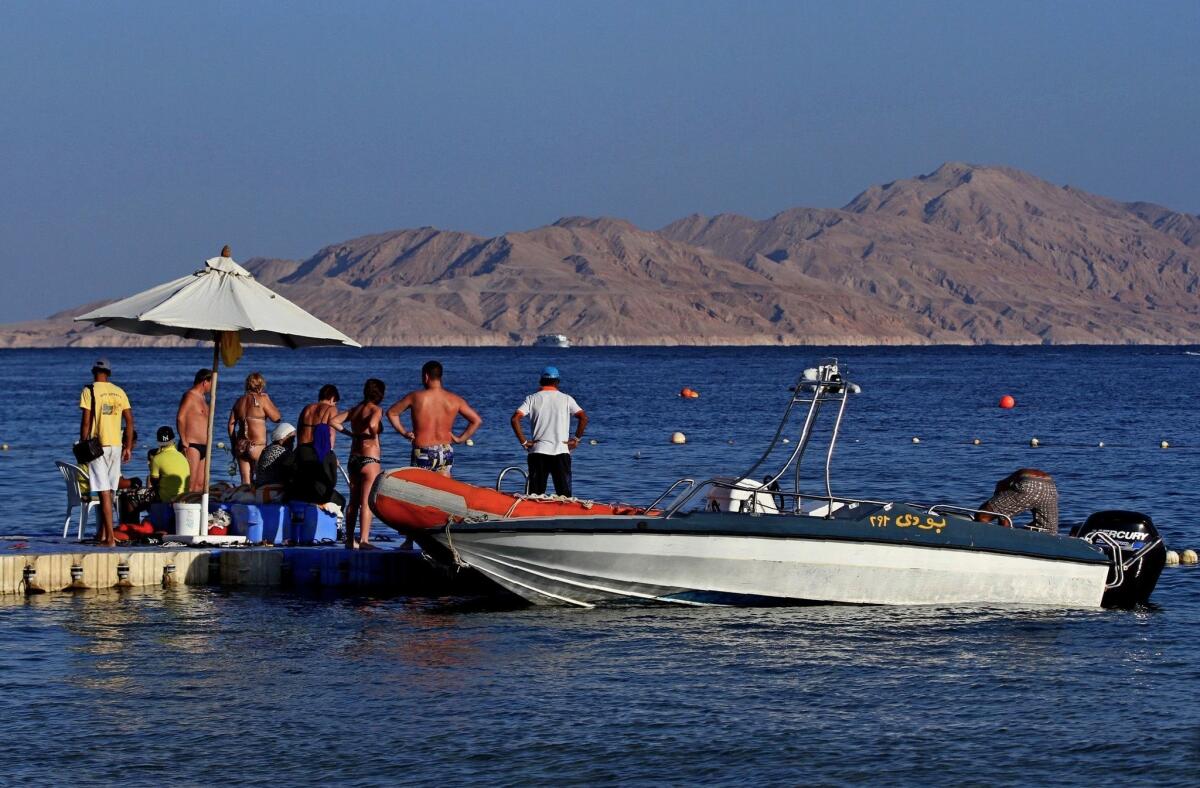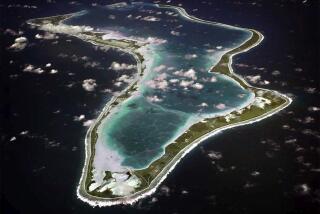Two desert islands: The gift for the country that has everything

Tourists at the Egyptian Red Sea resort of Sharm el-Sheikh prepare to board a boat for Tiran island in the Strait of Tiran in 2015.
Reporting from Cairo — You’re a world leader, and have just received a generous aid and investment package from a rich ally. How do you respond to such largesse? If you’re Egypt’s Abdul Fattah Sisi, you apparently give away an island. Or two.
Egypt’s strongman is facing a massive wave of domestic criticism after his Cabinet announced that Egypt was ceding two Red Sea islands to neighboring Saudi Arabia.
A statement issued by 82 public personalities on Tuesday, including two former presidential candidates, slammed the newly signed maritime border deal and called on parliament to veto it.
“The two islands are considered an Egyptian property and the constitution, which was approved by Egyptians, prevents any authority from ceding any parts of Egyptian territory,” the statement read.
On Saturday evening, Egypt’s Cabinet abruptly announced that a joint Egyptian-Saudi technical group had determined that the islands of Tiran and Sanafir in the Red Sea’s Gulf of Aqaba fall within regional Saudi maritime waters.

Egyptian President Abdul Fattah Sisi, left, shakes hands with Saudi Arabia’s King Salman in Cairo before the monarch ended his visit to Egypt on April 11, 2016.
The statement came during Saudi King Salman’s five-day visit to Cairo, where representatives of the two countries signed 17 financial deals and memorandums of understanding worth about $1.7 billion, including a bridge over the Red Sea that will connect the two countries.
Saudi Arabia and other Gulf Cooperation Council members such as the United Arab Emirates and Kuwait have been politically and financially backing Egypt’s administration since the army-led ouster of former Egyptian President Mohamed Morsi in 2013.
Egyptian opposition members regard relinquishing the disputed islands as a concession in return for Saudi financial aid.
See more of our top stories on Facebook >>
“The agreement came simultaneously with King Salman’s visit to Egypt amid talks over economic aid to Egypt, a fact which casts doubt over the time of signing such agreement,” the opposition statement added.
On Tuesday, the Egyptian Cabinet’s Information and Decision Support Center said that the two islands were only put under Egyptian management in 1950 when Egypt and Saudi Arabia “wanted to consolidate the Arab military position to face Israel,” given the islands’ strategic position at the mouth of the gulf. The Israeli port of Eilat is at the other end of the gulf.
In May 1967, Egypt blocked the passage of ships through the Strait of Tiran, Israel’s only maritime passage from the Gulf of Aqaba to the Red Sea, leading to the Six-Day War, which resulted in the Israeli capture of both Tiran and Sanafir and the whole of the Sinai Peninsula.
Israel returned them to Egypt in 1982 under provisions of the Camp David accords.
Neither island has ever been inhabited by either Egyptian or Saudi nationals, and had only a minor Egyptian security presence, aside from one month in 1967 when Egypt deployed soldiers to Tiran during the blockade of the strait.
Under the Camp David accords, a multinational force has been stationed on the islands since 1982 to ensure freedom of navigation through the strait.
Although they have no resorts, the islands nevertheless are famous for their coral reefs and have become a destination for tourists on excursions from the nearby resort town of Sharm Al-Sheikh.
Under the new deal, the strait will be regarded as international waters, rather than under Egyptian sovereignty. Saudi Arabia has already announced that it will honor the Egyptian-Israeli agreements.
Sisi, who was elected president with 96.9% of the vote in 2014, came to power on the strength of a campaign that held protecting Egypt’s sovereignty among its priorities.
But even ardent Sisi supporters condemned the decision to relinquish the islands.
Addressing the Cabinet on his TV talk-show on Tuesday, journalist and host Ibrahim Eissa -- known for previously backing Sisi against Morsi’s Muslim Brotherhood group -- launched a scathing attack against handing the islands to Saudi Arabia.
“You are wrong if you think that Egyptians will believe that the islands of Tiran and Sanafir are Saudi according to the farcical documents you are presenting,” Eissa said.
“Are these the best documents you could come up with? You are a disgrace,” he added.
Mustafa Kamel Sayed, a political science professor at the American University in Cairo, , said Saudi Arabia has a legal right to the islands. What enraged Egyptians, he said, was the manner in which the demarcation deal was carried out.
The bilateral agreement will be presented to Egypt’s House of Representatives, which will decide whether to ratify the agreement.
Hassan is a special correspondent. Special correspondent Nabih Bulos in Beirut contributed to this report.
ALSO
There’s a whisper of hope in Yemen as a cease-fire takes hold
Car bombing in southern Lebanon kills local Palestinian official
Kerry’s comments in Afghanistan on unity government spur anger, charges of U.S. interference
More to Read
Sign up for Essential California
The most important California stories and recommendations in your inbox every morning.
You may occasionally receive promotional content from the Los Angeles Times.










